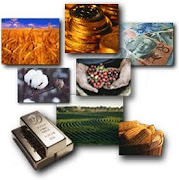Welcome To
490, Sathy IIIrd Crosss, Ist Street,
Gandhipuram, Coimbatore - 12.
Tel : +91 422 4347268, 3025310
Mobile : 98940 45624 - 9944445624
E-mail : sapriinvst@yahoo.co.in
About Us
SAPRI INVESTMENTS – Franchisee of
Who will guide me:
Our parent company Trendsetters Commodities & Services Private Limited, is an independent research firm with a rich experience of more than a decade in this futures industry.
COMMODITIES TRADED:
STC provides trading facilities for all commodities in MCX (Refer to the trade table for details regarding the commodities). We also facilitate delivery in commodities for clients who wish to give\take the same.
MODUS OPERANDI OF TRADING:
Commodity Account Opening
DOCUMENTS PRESCRIBED AS PER THE KYC NORMS
FOR INDIVIDUAL CONSTITUENTS:
Address Proof - self attested
Proof of Bank Account Number - self attested
ID Proof - self attested
Self certified photo copy of the PAN Card
FOR NON-INDIVIDUAL CONSTITUENTS:
Address Proof - self attested
Proof of Bank Account Number - self attested
Copy of latest Annual Report - self
Proof of date of incorporation, - self attested
Copy of Memorandum of Association & Articles of Association
Copy of Partnership Deed - self attested
Board Resolution authorizing the company officials to execute all the deeds / operations with the Exchange on behalf of the company,
Letter of Partnership firm (letterhead) authorizing partners to execute all the deeds / operations with the Exchange on behalf of firm.
Self certified photo copy of the PAN Card
One passport size photograph - self attested
Permanent Account Number - self attested
Address, Identity and signature proof - self attested
CHARGES AND FEES:
Account opening charges of Rs.500\-
Brokerage fees 0.6% on value traded
Exchange transaction fees of Rs.4 per lack -0.0004%on value traded
Service tax - 12.36% is applicable on the brokerage
BANKING:
For efficient clearing, settlement and guarantee system. We have Clearing and Settlement system with HDFC Bank & ICICI BANK as our Clearing Bank.
SERVICES:
Contract notes, statements showing Mark to Market Billing, the Margin amount, Brokerage, number of lots traded, number of open and liquidated positions will be sent by e-mail to the client.
Online Trading is provided for instantaneous execution of trades. Online news, views, charts and useful information will be given from time to time.
Analysis, predictions and recommendations will be given from time to time. Advance software assistance for technical analysis.
Training and educating clients from time to time.
We are using TELEQUOTE - No.1 Technical Software - Datas & Charts available from
MCX - NCDEX - FOREX - NYMEX - COMEX - LME & CRUDE OIL INVENTORY -
WITHDRAWALS:
All withdrawals shall be honored within third business days by means of account payee cheques from the date of submission of the signed withdrawal slip or through personalized mail.
Investment in Commodities:
In 2003, the ban on commodity trading was lifted after 40 years in
WHAT IS COMMODITY TRADING?
In common parlance, commodities means all types of products. However, the Foreign Currency Regulation Act (FCRA) defines them as 'every kind of movable property other than actionable claims, money and securities.'
Commodity trading is nothing but trading in commodity spot and derivatives (futures). If you are keen on taking a buy or sell position based on the future performance of agricultural commodities or commodities like gold, silver, metals, or crude, then you could do so by trading in commodity derivatives.
Commodity derivatives are traded on the National Commodity and Derivative Exchange (NCDEX) and the Multi-Commodity Exchange (MCX). Gold, silver, agriculture commodities including grains, pulses, spices, oils and oilseeds, mentha oil, metals and crude are some of the commodities that these exchanges deal in. Trading in
commodities futures is quite similar to equity futures trading. You could take a long position (where you buy a contract) or a short position (where you sell it). Simply speaking, like in equity and other markets, if you think prices are on their way up, you take a long position and when prices are headed south you opt for a short position.
REGULATORY BODY FOR THE COMMODITY TRADING MARKET IN
The Forward Markets Commission (FMC) is the regulatory body for the commodity market in
WHAT KIND OF PRODUCTS CAN BE LISTED ON THE COMMODITY MARKET?
All commodities produced in the agriculture, mineral and fossil sectors have been sanctioned for futures trading. These include cereals, pulses, ginned cotton, un-ginned, cotton, oilseeds, oils, jute, jute products, sugar, gur, potatoes, onions, coffee, tea, petrochemicals, and bullion, among others.
WHAT ARE THE RISK FACTORS?
Commodity trading is done in the form of futures and that throws up a huge potential for profit and loss as it involves predictions of the future and hence uncertainty and risk. Risk factors in commodity trading are similar to futures trading in equity markets. A major difference is that the information availability on supply and demand cycles in commodity markets.
WHAT ARE THE FACTORS THAT INFLUENCE THE COMMODITY PRICES IN THE MARKET?
The commodity market is driven by demand and supply factors and inventory, when it comes to perishable commodities such as agricultural products and high demand products such as crude oil. Like any market, the demand-supply equation influences the prices.


